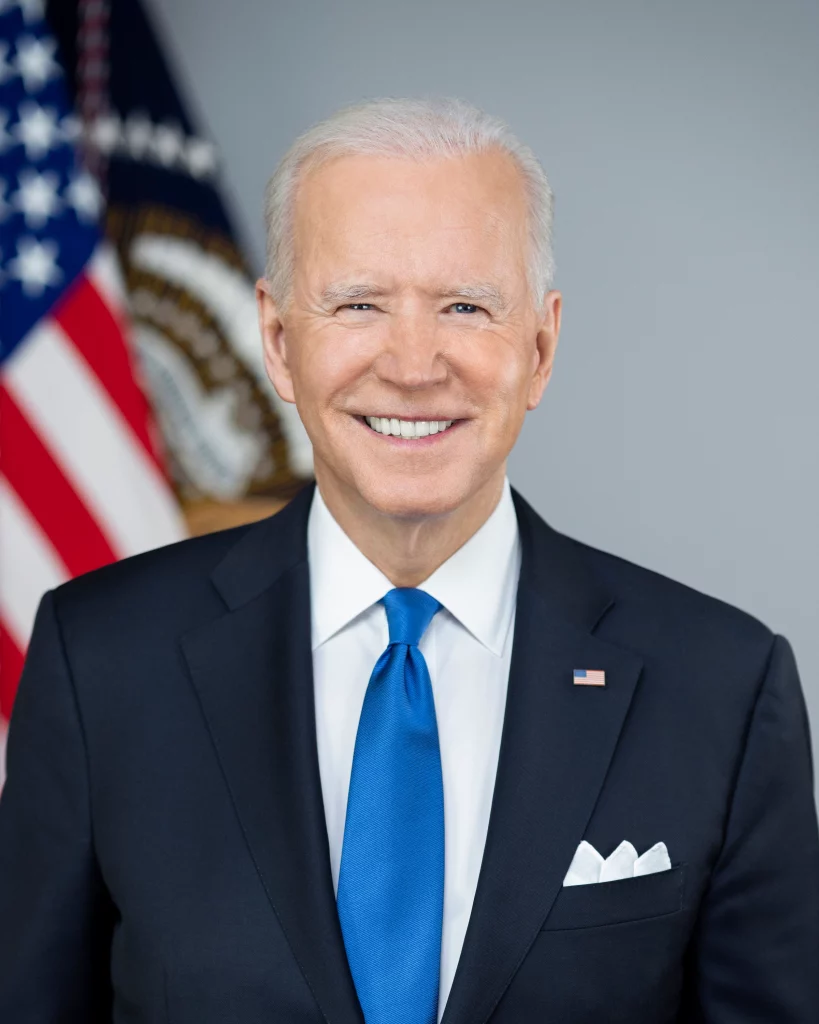Joe Biden, born on November 20, 1942, in Scranton, Pennsylvania, is the 46th President of the United States, serving since January 20, 2021. Biden, a member of the Democratic Party, has had a long and distinguished career in American politics, spanning over five decades. He previously served as Vice President from 2009 to 2017 under President Barack Obama, and before that, he was a U.S. Senator from Delaware for 36 years. Known for his resilience, empathy, and advocacy for working-class Americans, Biden’s life and career have been shaped by personal tragedies, perseverance, and a commitment to public service.
Early Life and Education
Joseph Robinette Biden Jr. was born into a middle-class Irish-Catholic family in Scranton, Pennsylvania. His father, Joe Biden Sr., struggled with financial instability after the collapse of the family business but later found steady work as a car salesman. Biden’s early years were marked by challenges, including a stutter that he worked hard to overcome. His family moved to Delaware when he was a teenager, where Biden attended the Archmere Academy, a Catholic prep school, and later the University of Delaware, where he studied history and political science.
Biden’s interest in politics grew during his college years. After graduating from the University of Delaware, he attended Syracuse University College of Law, earning his law degree in 1968. Shortly after, he returned to Delaware, where he began practicing law and became involved in local politics.
Tragic Loss and Early Political Career
In 1972, at the age of 29, Biden won a seat in the U.S. Senate, becoming one of the youngest senators in American history. However, his triumph was followed by tragedy. Just weeks after his election victory, Biden’s wife, Neilia, and their one-year-old daughter, Naomi, were killed in a car accident while Christmas shopping. His two sons, Beau and Hunter, were also in the car but survived with serious injuries.
Devastated by the loss, Biden considered resigning from the Senate to focus on raising his sons, but he was persuaded to stay. He famously took the Senate oath at his sons’ hospital bedside and commuted daily from Delaware to Washington, D.C., on Amtrak for decades, earning a reputation for his dedication to both his family and his constituents.
Senate Career (1973–2009)
During his 36 years in the U.S. Senate, Biden became a prominent figure in American politics. He chaired several important committees, including the Senate Judiciary Committee and the Senate Foreign Relations Committee. His work on domestic and international issues, as well as his bipartisan approach, earned him respect across party lines.
Key Legislative Achievements
As chairman of the Senate Judiciary Committee, Biden oversaw significant pieces of legislation. He was instrumental in passing the 1994 Crime Bill, which included provisions for expanding law enforcement, increasing penalties for violent crimes, and creating the Violence Against Women Act, which aimed to protect women from domestic violence and sexual assault. However, the crime bill has since been criticized for contributing to mass incarceration, a point that Biden has acknowledged.
Biden also played a key role in shaping U.S. foreign policy, particularly in his role as chairman of the Senate Foreign Relations Committee. He was involved in arms control negotiations, efforts to prevent nuclear proliferation, and advocating for NATO expansion. Biden supported U.S. intervention in the Balkans in the 1990s and initially backed the Iraq War in 2003, though he later became a critic of how the war was managed.
Vice Presidency (2009–2017)
In 2008, Barack Obama selected Biden as his running mate in his campaign for the presidency. Obama’s decision to choose Biden, a seasoned lawmaker with extensive foreign policy experience, was seen as a move to balance the ticket. The Obama-Biden ticket won the 2008 election, and Biden was sworn in as the 47th Vice President of the United States on January 20, 2009.
As Vice President, Biden was a key adviser to Obama on a range of issues, including foreign policy, the economy, and healthcare. He played a crucial role in the administration’s response to the Great Recession, helping to oversee the implementation of the $787 billion stimulus package, the American Recovery and Reinvestment Act, which aimed to stabilize the economy and create jobs.
Foreign Policy Leadership
Biden took a leading role in shaping U.S. foreign policy, representing the Obama administration on numerous international issues. He worked to strengthen U.S. relations with allies, particularly in Europe, and played a significant role in the administration’s response to Russia’s annexation of Crimea in 2014. Biden was also deeply involved in managing U.S. policy in Iraq and Afghanistan, advocating for a responsible drawdown of U.S. troops in both countries.
Domestic Policy and Social Issues
Domestically, Biden championed efforts to improve infrastructure, support the middle class, and advance civil rights. He was a strong advocate for the Affordable Care Act (ACA), which expanded healthcare coverage to millions of Americans. He also supported marriage equality, famously endorsing same-sex marriage in 2012, which many believe helped push the Obama administration toward publicly supporting the issue.
During his time as Vice President, Biden endured another personal tragedy when his eldest son, Beau, died of brain cancer in 2015. The loss deeply affected Biden, and he considered retiring from politics. However, the experience also reinforced his commitment to cancer research, leading to his role in the Obama administration’s “Cancer Moonshot” initiative, aimed at accelerating cancer research.
2020 Presidential Campaign and Election
After choosing not to run for president in 2016, Biden remained in the public eye as a respected elder statesman. However, in 2019, after a period of reflection and amid growing concerns about the direction of the country under President Donald Trump, Biden announced his candidacy for the 2020 presidential election.
Biden’s campaign focused on restoring the “soul of America,” promoting unity, and addressing the challenges posed by the COVID-19 pandemic. He advocated for a return to decency in politics, economic recovery, healthcare expansion, and combating systemic racism and climate change. Despite a crowded field of Democratic contenders, Biden secured the Democratic nomination and selected Senator Kamala Harris as his running mate, making her the first woman of South Asian and African American descent to be on a major party’s presidential ticket.
The 2020 election took place against the backdrop of the COVID-19 pandemic, widespread racial justice protests, and economic uncertainty. Biden won the election with over 81 million votes, the most in U.S. history, defeating incumbent President Donald Trump. His victory was seen as a repudiation of Trump’s divisive leadership, and Biden was sworn in as President on January 20, 2021.
Presidency (2021–Present)
As President, Biden inherited a nation facing significant challenges, including the COVID-19 pandemic, a struggling economy, and deep political polarization. He moved swiftly to implement a series of ambitious policies aimed at addressing these issues.
COVID-19 Response
Biden’s first priority upon taking office was managing the pandemic. His administration rolled out a comprehensive vaccination campaign, leading to the rapid distribution of COVID-19 vaccines across the country. The American Rescue Plan, a $1.9 trillion stimulus package, was passed to provide economic relief to Americans, support businesses, and strengthen public health measures.
Infrastructure and Economic Policy
Biden also focused on revitalizing the U.S. economy through infrastructure investment and addressing climate change. His administration passed the bipartisan Infrastructure Investment and Jobs Act in 2021, allocating $1.2 trillion for upgrading roads, bridges, public transit, and broadband infrastructure. Biden also pushed for green energy initiatives as part of his broader effort to combat climate change.
Foreign Policy and Global Leadership
On the global stage, Biden sought to restore U.S. alliances and reassert American leadership after the Trump administration’s “America First” approach. He rejoined the Paris Climate Agreement, recommitted to NATO, and worked to repair strained relations with European and Asian allies. However, Biden’s withdrawal of U.S. troops from Afghanistan in 2021, ending America’s longest war, drew widespread criticism due to the chaotic and violent nature of the exit.
Personal Life and Legacy
Joe Biden’s personal story is one of resilience and perseverance. He has been married to his second wife, Dr. Jill Biden, since 1977, and they have a daughter, Ashley. In addition to his two sons from his first marriage, Biden has remained deeply devoted to his family throughout his life.
As the oldest president to take office, Biden’s legacy will likely be judged by his ability to manage the pressing issues of his time—pandemic recovery, political division, and the fight against climate change. His career in public service, marked by personal tragedy and political triumphs, has made him a symbol of resilience and commitment to the American people. Whether through his legislative achievements, his time as Vice President, or his presidency, Biden’s impact on American politics and society is undeniable.
Created with ChatGPT



